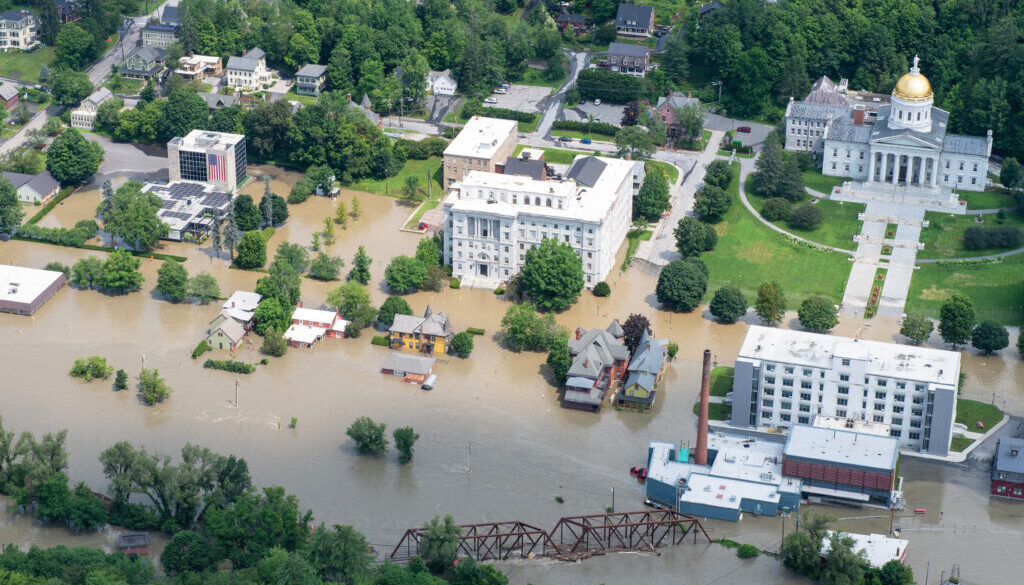Vermont advances bill targeting oil and gas companies for climate cleanup
By Dana Drugmand
In the aftermath of costly flooding that swept the US Northeast last year, lawmakers in Vermont on Tuesday advanced a proposed new law that aims to make fossil fuel companies liable for the costs of cleaning up communities battered by climate change-related events.
In a 26-3 vote, the state senate passed what state lawmakers are calling the “Climate Superfund Act.” If the bill becomes law, it would be the first of its kind in the country, imposing strict liability for carbon pollution on large oil and gas companies that produce carbon-based fuels. Like the federal Superfund program that holds polluters liable for hazardous waste contamination, the “climate superfund” concept proposes to replicate this polluter pays program for climate pollution.
“I’m proud to vote yes today to respond to the greatest overarching existential threat of our time,” Vermont Sen. Becca White said following the vote.
The measure now moves on to the Vermont House of Representatives, where support appears strong.
“This is a bill that had a lot of support going into the session,” said Ben Edgerly Walsh, climate and energy program director at Vermont Public Interest Research Group. “We’re pretty optimistic that the House is going to take it up and move it before the end of the session.”
Last July, exceedingly heavy rainfall led to damaging flooding in the US Northeast, submerging streets in Vermont’s capital city of Montpelier, as well as thousands of acres of farmland across the state. One hard-hit farming operation, the Intervale Community Farm in Burlington, Vermont, lost an estimated $200,000 of its vegetable crops when 99% of the farm flooded.
Vermont’s bill would assess a one-time fee on fossil fuel companies responsible for more than 1 billion metric tons of greenhouse gas emissions over the last 30 years. The bill leaves the task of determining which companies would pay, and how much each would owe, to the state’s Agency of Natural Resources and the state treasurer, as well as the task of calculating Vermont’s costs of recovering from and adapting to climate impacts.
Once the costs and the responsible parties are determined, the state would essentially bill the companies and the payments would go into an established fund to be used for climate adaptation and resilience projects.
“It would set a really important precedent,” said Anthony Iarrapino, a Vermont-based environmental lawyer and lobbyist. “Things look good for Vermont to lead in this way.”
According to a recent letter from law professors at Vermont Law and Graduate School and Yale Law School, Vermont’s bill, if enacted, “would, for the first time in the United States and arguably anywhere on the planet, unmistakably establish the responsibility of fossil fuel companies to help cover the monetary costs of adapting to the harmful impacts of climate change.”
The bill could come before the full House for a vote in late April or early May, and if approved it would then go to the governor’s desk. Even if Vermont Gov. Phil Scott, a Republican, decides to veto it, there’s a good chance the legislature could override the veto, according to observers.
A similar bill in New York passed the state’s Senate last year but then died in the state Assembly. The bill is now back in the Senate. Bills seeking to recover climate costs from the oil and gas industry have also been introduced in Massachusetts, Maryland, and in California.
Vermont Sen. Randy Brock expressed concern last week that the state could face daunting litigation costs if industry players seek to challenge the law in court.
A legal fight could drag out for years, according to Jennifer Rushlow, dean of the Maverick Llyod School for the Environment at Vermont Law and Graduate School, who testified in support of the bill in February.
“Vermont knows that and is realistic about that, and I’m sure is part of what the legislature has to weigh in sticking their neck out on a law like this,” she said.
Iarrapino said Vermont is certain to face challenges “going up against a powerful industry like the fossil fuel industry,” but Vermont won’t be alone as other states are likely to follow.
“It’s an idea whose time has come,” he said.
(Featured photo of flood damage in Montpelier, Vermont on July 11, 2023. Credits: U.S. Department of Defense, Air Force Senior Master Sgt. Michael Davis)
 EWG
EWG



April 3, 2024 @ 9:29 am
So 26-3. Only three sane people in the Senate. Just another Democrat money grab.